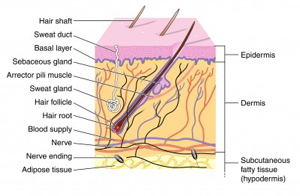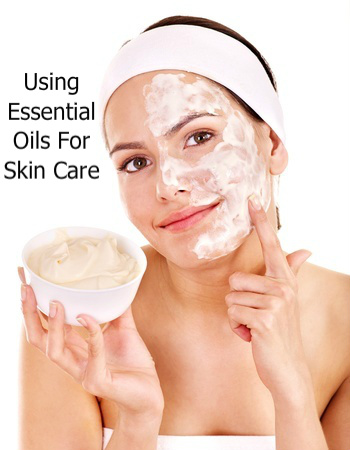- Home
- Essential Oils for Skin Care
As an affiliate with Bookshop, Amazon, and other programs, I may earn revenue from qualifying purchases through affiliate links. This does not affect the price you pay. Privacy Policy / Disclosures. This site is for educational purposes only.
Search this site:
How to Use Essential Oils for Skin Care
Using essential oils for skin care is a natural way to avoid the possibly toxic ingredients in many commercial face care products. Essential oils for the face may have the following effects:
- Help stimulate the production of new cells to help heal sun damage, burns, wrinkles, or wounds
- Reduce bacterial and fungal infections, acne, and related skin problems
- Soothe sensitive, inflamed skin
- Regulate oil production
First, let's look at the structure of the skin, followed by precautions for using essential oils. Then, we'll get into specific suggestions for different skin types.
Structure of the Skin
Skin is your body's largest organ, making up 16 to 20 percent of your body weight. The skin has three structural layers: epidermis, dermis, and subcutis (also called subcutaneous fatty tissue).
The epidermis is the outer layer of skin cells. It protects the body from the invasion of bacteria, viruses, and other foreign materials. It's continually shedding cells, as newer cells push their way to the surface. The epidermis completely replaces itself every 35 to 45 days. So, with any new skin care routine, allow that much time to see significant visible results.

The dermis is the supportive connective tissue between the epidermis and the underlying subcutis, which is an important layer of loose connective tissue and fat. Collagen in the dermis gives skin strength and resiliency and also helps hold in water. Elastin in the dermis gives skin its ability to stretch. Both collagen and elastin production tend to decrease with age, leading to issues such as wrinkles, sagging skin, and dry skin.
Cautions for Using Essential Oils for Skin Care
Most essential oils are generally safe, although some may cause a skin reaction for a few people. Proper dilution is important. Check the cautions of essential oils, as a few are not recommended for skin use. Here are precautions for general aromatherapy skin care:
- Spot test an essential oil or aromatherapy skincare recipe to make sure you aren't sensitive to it.
- Make sure you use only authentic, high-quality essential oils. Low-quality or adulterated oils may irritate your skin, or you may not receive the desired benefits.
- Store essential oil blends for skin care in a cool, dark place. For longest life, store aromatherapy products in the refrigerator. Throw out any product that starts to smell bad.
- Some essential oils can make your skin more sensitive to sun, and you need avoid sun exposure or tanning beds after using those oils. Know the cautions for any oil you choose to use.
Best Oils for Skin Care
The best essential oils for face care depend largely on your type of skin. If you have combination skin, you may need to treat each area separately, using the appropriate essential oils.
However, almost any type of skin can benefit from these balancing essential oils:
- Geranium
- Jasmine
- Lavender
- Neroli
- Rose
For specific aromatherapy recipes for skin care, see the following articles on this website.
Essential oils for your face:
- Essential Oils for Dry Skin
- Essential Oils for Oily Skin
- Essential Oils for Sensitive Skin
- Essential Oils for Aging Skin
- Essential Oils for Wrinkles
- Essential Oils for Normal Skin
- Essential Oils for Couperose Skin
- Essential Oils for Rosacea
- Essential Oils for Acne and Face Masks for Acne
- DIY Face Mask Recipes
- Facial With Essential Oils
- Essential Oils for Lip Balm
For skin conditions of the body:
- Skin tags, age spots, warts, boils, hives, and blisters
- Cellulite
- Eczema
- Psoriasis
- Scars
- Stretch Marks
- Sunburn
Sources
- Aromatherapy for Health Professionals
- Aromatherapy: A Complete Guide to the Healing Art
- Human Anatomy & Physiology
Photo Credits: 123RF Stock Photo

